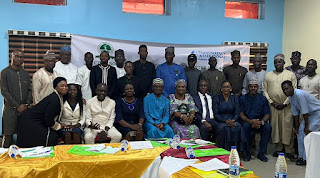Nestle’s $7m quality Assurance Centre: Delivers safe food to consumers’ door step
Over 200 diseases are caused by unsafe food containing harmful bacteria, parasites, viruses, chemical substances It is estimated that two million deaths occur every year from contaminated food or drinking water.
Food safety is a scientific discipline describing handling, preparation, and storage of food in ways that prevent food borne illness. This includes a number of routines that should be followed to avoid potentially severe health hazards. Food borne diseases take a major toll on health. Millions of people fall ill and many die as a result of eating unsafe food. Deeply concerned by this, WHO Member States adopted a resolution in 2000 to recognize food safety as an essential public health function. Consequently, the world health body devoted this year’s World Health Day to highlight the challenges and opportunities associated with food safety under the slogan “From farm to plate, make food safe.” Food safety encompasses actions aimed at ensuring that all food is as safe as possible.
 |
| Cross section of journalists from Central Africa at the Agronomy Plant Sciences during the recent visit to Nestle Quality Assurance Centre, Abidjan, Cote d’Ivoire |
Food safety policies and actions need to cover the entire food chain, from production to consumption. I don’t think most people are aware ofing that the food they eat is safe,” John O’Brien, Head of the Food Safety and Integrity Research Programme at the Nestle Research Center in Lausanne, Switzerland, said recently. “It’s only when something goes wrong that they sit up and take notice.” To this effect, Nestle, one of the world’s leading nutrition, health and wellness company, has stepped up efforts to maintain the safety of its products to consumers. Therefore, it’s Research and Development (R & D) Centre of the company in Abidjan, Cote d’Ivoire, has been expanded by constructing a seven million-dollar state-of-the-art laboratory to thoroughly examine every product before bringing it to the doorstep of the consumers. The centre was established in 1991 and closed down in 2002, following the political upheaval in Cote d’Ivoire, but re-opened in 2009.
It has fully bounced back with more innovative measures including the inauguration of the Nestle Quality Assurance Centre, first of its kind in the West Africa sub-region and second in Africa after South Africa. Conducting 20 selected journalists from West and Central Africa round the Quality Assurance Centre which was inaugurated in April this year, Dr. Owen Fraser, Head of the Centre, said that the laboratory would solely deal with the analysis of chemical contaminants such as mycotoxins, pesticides, heavy metals and other minerals which are dangerous to human health. “You know in Nestle, safety of our products and the well-being of our customers or clients are our topmost priority. We will forever do what it takes to ensure that safety is not compromised,” Dr. Fraser told the journalists.
Responding to questions from journalists, the Head of the Centre said that the company decided to set up the centre in Cote d’Ivoire and not Nigeria or Ghana, which also produce cocoa and other raw materials used by the company, because of the reliability of power and water supply. The journalists also visited the Nursery, Sensory and Consumer Insight Department as well as the product development and culinary departments. Mr. Oliver Chmiel, Head of the Research and Development Centre, Abidjan, said the centre’s vision was to become a centre of excellence by developing five key areas – plant science, tropical agronomy and biofortification, packaging design development adapted to local needs, extrusion and roller drying technology, African consumer understanding, and nutritional products and ingredients development for African consumers.
Chmiel also said that the centre presently focused on two of the areas, namely plant science, tropical agro-nomy and biofortification, as well as extrusion and roller drying technology. He commended the journalists for visiting the area to acquaint themselves with the operations of Nestle, and told them that as partners in development, they should not hesitate to draw the attention of the company (Nestle) should they (journalists) come across any of their products consumers complained about. The Head of the Research and Development Centre said: “We see you as one of our major stakeholders whose contribution is key for the progress of the company and safety of the people.”
This story was published in Newswatch Times on June 18, 2015.



Comments
Post a Comment